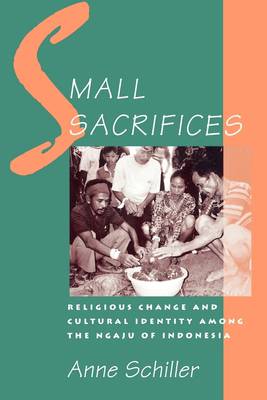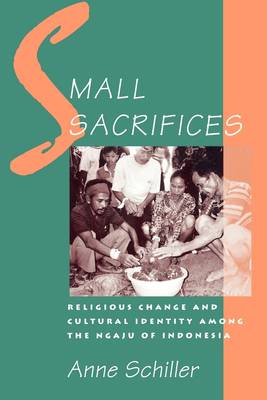
- Afhalen na 1 uur in een winkel met voorraad
- Gratis thuislevering in België vanaf € 30
- Ruim aanbod met 7 miljoen producten
- Afhalen na 1 uur in een winkel met voorraad
- Gratis thuislevering in België vanaf € 30
- Ruim aanbod met 7 miljoen producten
Zoeken
Small Sacrifices
Religious Change and Cultural Identity Among the Ngaju of Indonesia
Anne Schiller
Paperback | Engels
€ 133,95
+ 267 punten
Omschrijving
Small Sacrifices is an ethnographic study of Ngaju Dayaks, rain forest dwellers of the remote interior region of Central Kalimantan, Indonesian Borneo. Like many indigenous peoples throughout the world, the Ngaju have recently been affected by exposure to world religions, by improvements in transportation and communication, by new demands on family-based production, and by other factors pertaining to their growing incorporation into an expanding state system in an era of rapid political and economic change. The Ngaju response to these pressures, Anne Schiller contends, is most clearly seen in the religious sphere. Over the past two decades, many Ngaju have taken to recasting and reinterpreting their indigenous religion, known formerly as Kaharingan, and now as Hindu Kaharingan. Paradoxically, this process of religious change involves the codification of religious belief and the standardization of ritual. It also includes efforts to distinguish "religious practices" from other "customs." These developments figure importantly in the construction of modern Ngaju identity. The author focuses especially on the form and content of tiwah, an elaborate ritual of secondary treatment of the dead, with multiple and complex meanings for Hindu Kaharingan Ngaju, as well as for those who have converted to Christianity or Islam.
Specificaties
Betrokkenen
- Auteur(s):
- Uitgeverij:
Inhoud
- Aantal bladzijden:
- 192
- Taal:
- Engels
Eigenschappen
- Productcode (EAN):
- 9780195095586
- Verschijningsdatum:
- 22/05/1997
- Uitvoering:
- Paperback
- Formaat:
- Trade paperback (VS)
- Afmetingen:
- 155 mm x 235 mm
- Gewicht:
- 308 g

Alleen bij Standaard Boekhandel
+ 267 punten op je klantenkaart van Standaard Boekhandel
Beoordelingen
We publiceren alleen reviews die voldoen aan de voorwaarden voor reviews. Bekijk onze voorwaarden voor reviews.











